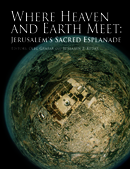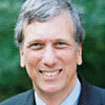

Vol 1, Issue 1 • Fall 2010
Views on the Sacred Esplanade
LISAR fall events also feature Thering Fellow Arnold Eisen
One of the most extraordinary spaces on earth, Jerusalem’s Esplanade has long been regarded as sacred by the three Abrahamic faiths. For Judaism, it is where the Solomonic and Herodian Temples once stood. For Christendom, it is the site of the Herodian Temple,  which Jesus repeatedly visited, announcing the advent of a new worship of God. For Islam, it is the holy space to which the Prophet Muhammad traveled on his Night-Journey and Ascension, and which holds the Dome of the Rock and the Aqsa Mosque.
which Jesus repeatedly visited, announcing the advent of a new worship of God. For Islam, it is the holy space to which the Prophet Muhammad traveled on his Night-Journey and Ascension, and which holds the Dome of the Rock and the Aqsa Mosque.
The Lubar Institute for the Study of the Abrahamic Religions (LISAR), in cooperation with the Oslo Center for Peace and Human Rights, is pleased to present a public symposium discussing “Jerusalem’s Sacred Esplanade” on Tuesday, September 28, at 7:30 pm in the Auditorium of the Wisconsin Historical Society.
This free event, funded in part by the Evjue Foundation and held in cooperation with the Wisconsin Book Festival, will feature a panel of experts discussing a variety of themes from the groundbreaking book Where Heaven and Earth Meet, edited by Oleg Grabar and Benjamin Z. Kedar. Kjell Magne Bondevik, founder of the Oslo Center and former Prime Minister of Norway, will open the program.
![]()
 In October, the Institute will welcome Arnold Eisen, one of the world’s foremost experts on American Judaism, to serve as LISAR’s third annual Rose Thering Fellow.
In October, the Institute will welcome Arnold Eisen, one of the world’s foremost experts on American Judaism, to serve as LISAR’s third annual Rose Thering Fellow.
Eisen is currently the Chancellor of the Jewish Theological Seminary. As part of his scholar-in-residency, Eisen will hold conversations with small groups of faculty, students and the community as well as deliver the public lecture, “Toward a Jewish Theology of Religious Pluralism,” on Tuesday, October 12, at 7:30 pm at UW’s Grainger Hall.
![]()
 When it opened in July, 2005, the Lubar Institute for the Study of the Abrahamic Religions consisted of one person puzzling over how to outfit an office and implement Sheldon and Marianne Lubar’s ambitious project to illuminate the historic and contemporary relationships between Jews, Christians and Muslims.
When it opened in July, 2005, the Lubar Institute for the Study of the Abrahamic Religions consisted of one person puzzling over how to outfit an office and implement Sheldon and Marianne Lubar’s ambitious project to illuminate the historic and contemporary relationships between Jews, Christians and Muslims.
Five years — not to mention five conferences, one sculpture installation, two Thering Lectures, two museum exhibitions, and dozens of other events later — LISAR engages more than a dozen part-time staff and student fellows, along with dozens of faculty, other students, and community members. Our conversation partners include individuals who live near and not-so-near campus, as well as noteworthy intellectual, cultural, and religious institutions like the Oslo Center for Peace and Human Rights, the Faculty of Theology at the University of Oxford, the New York Public Library, and the Council of Centers on Jewish-Christian Relations.
Two concepts — one novel, the other more familiar — drive the Institute’s program. The first can be called the “Abrahamic Moment:” a re-examination of classical “Western” moral, religious and intellectual culture structured by the possibility that it derives not from exclusively Christian or even “Judeo-Christian” influences but from Islam’s theological roots, historical development, and normative values as well. That the relationships between Jews, Christians, and Muslims have often been vexed, even brutal, is clear; that these conflicts demonstrate an irreconcilable enmity between the “Peoples of the Book” is not.
The second notion — the “Wisconsin Idea” — has long configured thought and action along Lake Mendota’s shores. It posits that the boundaries of the University of Wisconsin extend to the borders of the state — and, in its twenty-first century incarnation, encompass the world. LISAR’s outreach mission involves applying knowledge about the Abrahamic traditions and the dynamics of American religious pluralism to strengthen the nation’s civil society.
LISAR resides in a world-class research facility with a proud history of public service. Affiliated with no religious tradition, UW-Madison comprises neutral ground that is open to all persuasions, religious and secular. One can hardly imagine a more propitious location in which to essay the Abrahamic Moment.
![]()
LISAR
Fellows
Voice
Farha Fatima Tahir,
LISAR Fellow, 2006
 As a high school student, I was active in the world of interfaith work. I was on the organizing committee of the Interfaith Youth Forum, the Gamaliel Chair in Peace and Justice, and put together interfaith events for students regularly. Needless to say, joining LISAR as an undergraduate wasn’t much of a leap.
As a high school student, I was active in the world of interfaith work. I was on the organizing committee of the Interfaith Youth Forum, the Gamaliel Chair in Peace and Justice, and put together interfaith events for students regularly. Needless to say, joining LISAR as an undergraduate wasn’t much of a leap.
The opportunity to be involved with LISAR has been nothing short of transformative. The Forum was an excellent opportunity to engage with peers of all different backgrounds and ideologies — both within my faith tradition and in others. Beyond that, the Fellowship offered a unique opportunity to play a strategic role in campus- and community-interfaith relations.
On a social level, LISAR created a platform to create lifelong friendships and unique collaborations. And now it has been catapulted to the national stage, playing a truly unique role in American religious life. Not only is it for the religiously inclined, but also for those interested in understanding various social currents in American life. I have never come across an organization so nimble,
yet focused.
The personal growth that came from LISAR came in various forms: professional, academic, social, and spiritual. I gained skills in management, public speaking, and organization. I learned how to think critically. I interacted with a diverse group of dynamic individuals. I reconnected with my faith. LISAR offered an unforgettable series of events.
LISAR plays an indispensible role on the UW campus and will only do so on a bigger scale as it continues to expand. I look forward to seeing what lies ahead!
![]()
 Contributing to the expansion of LISAR offers the opportunity to participate in an unparalleled effort: this collective campaign involving Muslim, Christian and Jewish students, faculty and community members has resulted in a truly unique joint academic enterprise. And like our programs and projects, our donors too have reflected our goal for productive collaboration, coming from a variety of traditions.
Contributing to the expansion of LISAR offers the opportunity to participate in an unparalleled effort: this collective campaign involving Muslim, Christian and Jewish students, faculty and community members has resulted in a truly unique joint academic enterprise. And like our programs and projects, our donors too have reflected our goal for productive collaboration, coming from a variety of traditions.
Gifts to the LISAR Fund provide vital support for student and community forums, public lectures, conferences and other activities of the Institute. Donations enable us to bring together Jewish, Christian and Muslim undergraduate students for thoughtful discussions as well as provide workshops for secondary- and elementary-level teachers about the Abrahamic traditions. Your gift can make a meaningful difference!
The campaign for LISAR, like the Institute itself, is unique; it could happen only at a public institution with a long tradition of civic involvement like UW-Madison. We invite you to become a part of this unprecedented enterprise. You can easily make an online donation to the Lubar Institute via secure server, or you can make a gift by mail by contacting our UW Foundation representative:
Stephen Wald, Director of Development
College of Letters and Science
University of Wisconsin Foundation
608-263-2202 (office) 608-287-6480 (cell)
stephen.wald@supportuw.org
